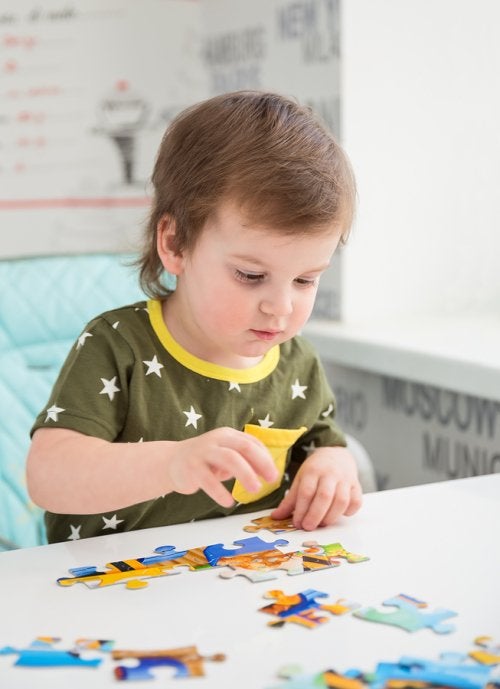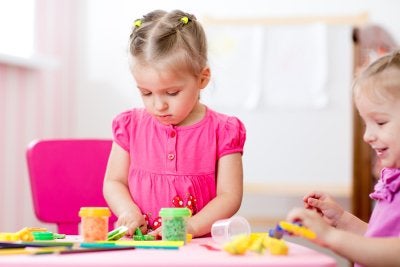-
The Importance of Hands-On Puzzles for Your Child’s Development
Few things are as important in early education and child development as hands-on activities. Puzzles are often used in early education classrooms as a tool to help children learn. You can bolster your child’s success in early education in Pembroke Pines by keeping hands-on puzzles available at home as well.
Hands-on puzzles provide three learning experiences for early education students. First, they get the opportunity to work on fine motor physical skills by holding the pieces and working them into different positions until they fit. Students get to practice cognitive skills as they attempt to solve the problem presented by the puzzle. Young learners also build emotional skills by working on puzzles, as they must practice patience and perseverance as they work to solve the puzzle and then are rewarded with the satisfaction of finishing the puzzle. When children solve puzzles together, they also get to practice social skills and learn to compromise and work collaboratively. Provide a variety of different puzzle types to boost your child’s learning experience.

-
Easy Tips for Improving Attention Spans in Pre-K Students
Attention is a challenging issue for parents and teachers of pre-K students alike. In the pre-K classroom, working on attention spans is part of the learning process, as students become more adept at learning the differences between work time and playtime. Attention span issues can be even more challenging today, when young children are accustomed to entertainment with digital devices and constant distractions. Although the ability to be attentive naturally increases with age, there are things you can do to help your student in pre-K in Pembroke Pines . Try these tips to boost the attention span of your pre-K student.

Reduce Distractions
Nearly anything can be a distraction when a young student is tackling a task he or she may not really want to do. Before your child has to concentrate on something, make sure he or she is well rested, not hungry or thirsty, and has used the bathroom. Don’t have the TV or music on, and keep digital devices tucked away. Give your child space and time to concentrate on one thing, and he or she will become more adept at tuning his or her attention to the right things.
Get Ready for the Day
If your child’s attention problems occur most often in the pre-K classroom, make sure he or she is ready for the day when you arrive at school. Avoid showing DVDs in the car, and eat breakfast at home when possible, instead of on the go. Put shoes on at home, rather than in the car. The ride to school should be a calm time when you can help your child focus on getting ready for school. Watching a DVD while frantically eating breakfast and rushing to finish getting dressed in the car will result in your child arriving at school feeling anxious and exasperated instead of ready to sit down in the classroom.
Have Realistic Expectations
As a general rule of thumb, the number of minutes your child should be able to pay attention is his or her age in years multiplied by two to five . Anything outside of that is unrealistic. Try breaking tasks up into timed chunks that fit into these windows so your child doesn’t become frustrated, which negatively impacts attention spans.
-
Try This Nature Craft with Your Young Learner
Arts activities are a terrific way to help preschool-age kids work on fine motor skills. In this video, you’ll learn an activity that is great for early childhood development and can be done at home with your preschool-age child in Pembroke Pines.
In this video, you’ll learn how to make a cactus plant using painted rocks. Encourage your child to find rocks of different sizes and then paint them to look like cacti. Like many great preschool activities, this project enhances fine motor skills by having your child work with small instruments, like paintbrushes. It also lets him or her work with colors, sizes, and shapes. In the end, your preschooler will have a project to display in his or her room and will have practiced several important skills.
-
Does Your Child Get Too Much Screen Time?
One issue that today’s parents have to face much more than in the past is the question of screen time. Experts believe that spending too much time in front of a screen can damage early childhood development and make learning more difficult. Here is what you need to know about screen time and your child’s education and how limiting screen time can protect your child’s development in Pembroke Pines.

Defining Screen Time
In a world where we are constantly surrounded by digital technology, defining “screen time” is more difficult than ever. Furthermore, children are often expected to use computers in school and for homework. The experts of the American Academy of Pediatrics defines screen time as time spent using a digital device for entertainment purposes, so using a computer or other device for an academic exercise doesn’t count. However, it is more important to be in tune to how your child responds to being in front of a screen than to rate what activities count as entertainment and which do not.
Age-Related Recommendations
The American Academy of Pediatrics says that children should not have any screen time between birth and 18 months, as it can cause overstimulation, distress, and a disconnect between children and parents. Children aged two to five can have one hour of screen time per day. For children and teens six and older, screen time should be determined by parents based on the child’s overall behavior and the amount of time he or she has left in the day after all other needs and responsibilities are met.
Choosing the Right Screen Time
Some screen time can actually aid in child development. For instance, interactive tools such as Skype can be helpful for young children as they help them practice language and other skills. In other cases, apps can help children practice numbers, shapes, sounds, and letters. For healthy child development, limit the amount of screen time that is spent passively watching a show or movie—and that includes commercials that can over-stimulate a young child.
RECENT POSTS
categories
- Uncategorized
- Early Learning Center
- Pre-K
- Children
- Child Care Center
- Preschooler
- Preschool Blog Category | Tanglewood Academy
- Preschool Lunch
- Tanglewood Academy
- After-School Program
- Toddler School
- Early Childhood Education
- preschool activities
- pre-kindergarten
- childhood education
- pre-kindergarten programs
- Children’s education
- enrichment opportunities
- Kindergarten
- Nurturing Education Environment
- Toddler Care
- Child Separation Anxiety
- Toddlers
- Summer camp
- summer activities
- VPK
- Voluntary Pre-K
- Outdoor Activities
- Smart Strategies
- Tie Shoes
- Snacks
- Physical Activities
- Education
- Enrichment Activities for Kids
- Early Education Activities
- Preschool Curriculum
- Classroom Learning
- APPLE accreditation
- Language Comprehension
